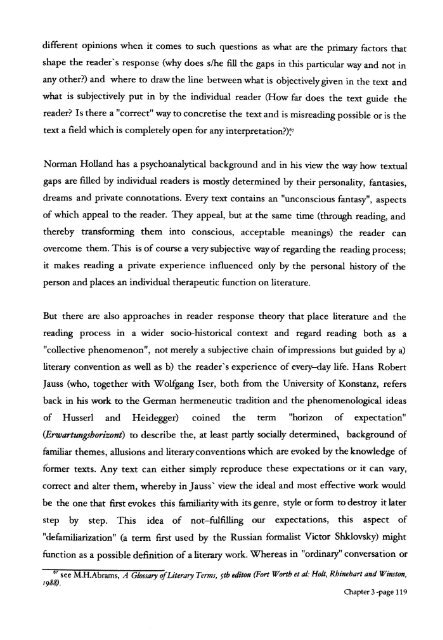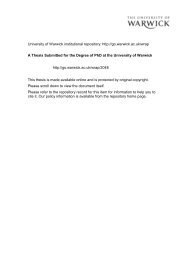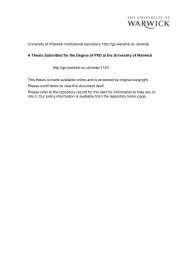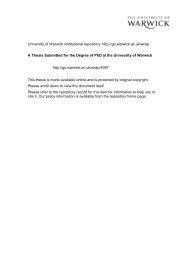From Page to Screen - WRAP: Warwick Research Archive Portal ...
From Page to Screen - WRAP: Warwick Research Archive Portal ...
From Page to Screen - WRAP: Warwick Research Archive Portal ...
You also want an ePaper? Increase the reach of your titles
YUMPU automatically turns print PDFs into web optimized ePapers that Google loves.
different opinions when it comes <strong>to</strong> such questions as what are the primary fac<strong>to</strong>rs that<br />
shape the reader's response (why does s/he fill the gaps in this particular way and not in<br />
any other?) and where <strong>to</strong> draw the line between what is objectivelygiven in the text and<br />
what is subjectively put in by the individual reader (How far does the text guide the<br />
reader? Is there a "correct" way <strong>to</strong> concretise the text and is misreading possible or is the<br />
text a field which is completely open for any interpretation/P'<br />
Norman Holland has a psychoanalytical background and in his view the way how textual<br />
gaps are filled by individual readers is mostly determined by their personality, fantasies,<br />
dreams and private connotations. Every text contains an "unconscious fantasy", aspects<br />
of which appeal <strong>to</strong> the reader. They appeal, but at the same time (through reading, and<br />
thereby transforming them in<strong>to</strong> conscious, acceptable meanings) the reader can<br />
overcome them. This is of course a very subjective way of regarding the reading process;<br />
it makes reading a private experience influenced only by the personal his<strong>to</strong>ry of the<br />
person and places an individual therapeutic function on literature.<br />
But there are also approaches in reader response theory that place literature and the<br />
reading process in a wider socio-his<strong>to</strong>rical context and regard reading both as a<br />
"collective phenomenon", not merely a subjective chain ofimpressions butguided by a)<br />
literary convention as well as b) the reader's experience of every-day life. Hans Robert<br />
[auss (who, <strong>to</strong>gether with Wolfgang Iser, both from the University of Konstanz, refers<br />
back in his work <strong>to</strong> the German hermeneutic tradition and the phenomenological ideas<br />
of HusserI and Heidegger) coined the term "horizon of expectation"<br />
(Erwartungshorizont) <strong>to</strong> describe the, at least partly socially determined, background of<br />
familiar themes, allusions and literaryconventions which are evoked by the knowledge of<br />
former texts. Any text can either simply reproduce these expectations or it can vary,<br />
correct and alter them, whereby inJauss' view the ideal and most effective work would<br />
be the one that first evokes this familiarity with its genre, style or form <strong>to</strong> destroy itlater<br />
step by step. This idea of not-fulfilling our expectations, this aspect of<br />
"defamiliarization" (a term first used by the Russian formalist Vic<strong>to</strong>r Shklovsky) might<br />
function as a possible definition of a literary work. Whereas in "ordinary" conversation or<br />
67 see M.H.Abrarns, A Glossary ofLiteraryTerms, 5th edi<strong>to</strong>n (Fort Worth et al:Holt, Rhinehartand Wins<strong>to</strong>n,<br />
1988),<br />
Chapter 3 -page 119





